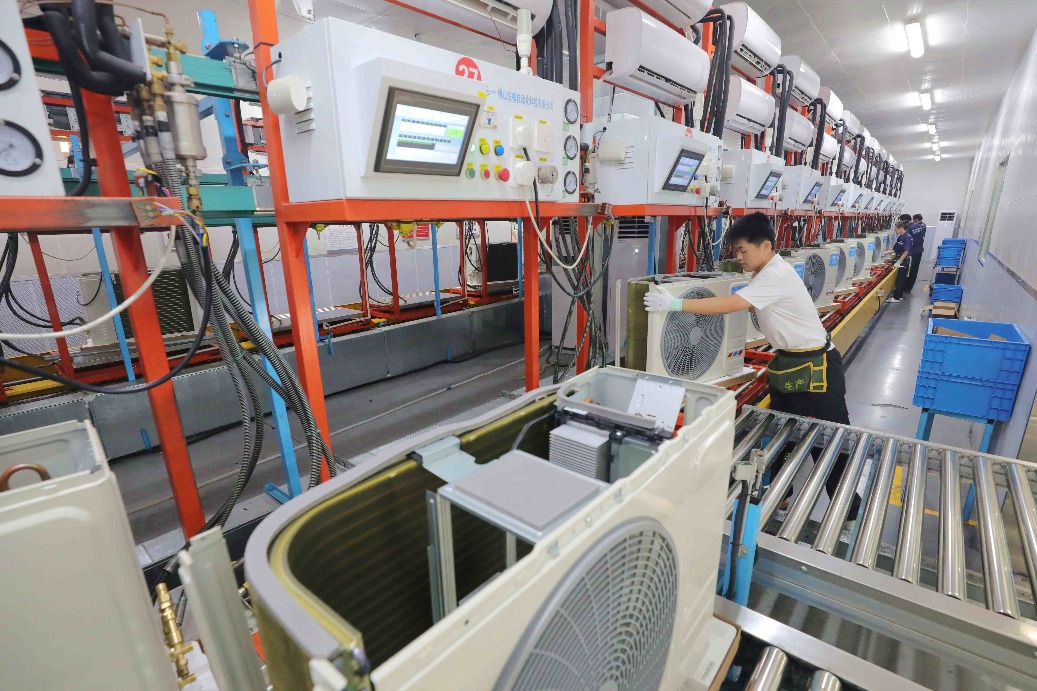Unified stance against latest US crackdown
Washington's semiconductor move to have 'limited' impact on China


The United States' third crackdown on China's semiconductor industry in three years will have "limited" impact on Chinese companies and only accelerate the self-reliance of the world's most crucial chip application market, the largest consumer of automobiles and the single largest smartphone market, industry insiders said on Tuesday.
They made the comments as four of the country's top industry associations on the semiconductor, automotive, internet and telecommunications industries hit back at the latest US move to expand export restrictions to 140 Chinese companies from accessing US semiconductor-making equipment and advanced chip technology.
"The unified stance expressed by industry associations, particularly the call for prudence in purchasing US chips, is unprecedented," said Xiang Ligang, director-general of the Zhongguancun Modern Information Consumer Application Industry Technology Alliance, a telecom industry association.
Xiang said that it sent a very clear message that China's technological prowess has reached a point where the country no longer needs to tolerate this.
"If the US continues to impose sanctions round after round, it will end up losing the entire chip market, and US chips will only be left at home and be 'eaten like cookies'," he said.
Such statements are a "trendsetter", suggesting that other Chinese industries may follow to accelerate the adoption of domestic chips, driving local chip breakthroughs, a CITIC Securities report said.
On the other hand, some multinational enterprises are likely to implement "China for China" strategies, producing chips within the Chinese mainland to meet local demand, which is expected to boost the development of China's chip manufacturing sector as a whole.
The report emphasized: "As the market has already anticipated this, many Chinese firms have made prior preparations, thus the short-term impact is limited."
Naura Technology Group, a major chip firm added to the new control list, responded that its operations remain normal and that being listed "would not substantially affect its business".
In a statement on Tuesday, the China Semiconductor Industry Association said that recent moves have made US chip products "no longer secure and reliable", forcing Chinese companies to be more cautious in purchasing US chips.
The Internet Society of China urged domestic companies to think carefully before procuring US chips and seek to expand cooperation with chip firms from countries and regions other than the US. It also encouraged domestic firms to proactively use chips produced by both domestic and foreign-owned enterprises in China.
The China Association of Communication Enterprises vowed that the Chinese government should investigate how secure the supply chain of the country's critical information infrastructure is and should take actions to ensure its safe operations.
The China Association of Automobile Manufacturers also said that the Chinese automotive industry's trust and confidence in purchasing chip products from US companies are being "shaken".
China has long been the most crucial application market for the global integrated circuit industry. The country is the world's largest producer and consumer of automobiles and the single largest smartphone market.
Data from market consultancies like TechInsights showed that last year, China accounted for about 30 percent of global semiconductor demand, but its production represented only 7 percent of the global total, with a self-sufficiency rate of approximately 23 percent. Of this, 12 percent came from domestic enterprises while 11 percent was contributed by foreign companies manufacturing in China.
Fu Qiang, an analyst from Ping An Securities, said that the semiconductor industry relies on globalization to reduce investment risks for individual regions and leverage comparative advantages.
"US moves will only fragment global supply chains and hinder healthy industry development," Fu said. "Also, as China is a critical market for semiconductor products and equipment, many US firms have significant involvement in China, and US restrictions will only limit their own growth opportunities."
chengyu@chinadaily.com.cn




































